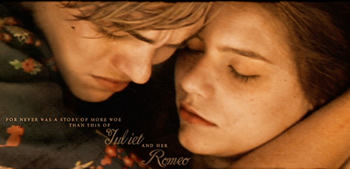Lesson 5.2B: Act II
Like a good television show that keeps the audience hanging from episode to episode, Shakespeare continues to move back and forth from one part of the story to the next. We've seen Romeo and Juliet quickly fall in love, but Shakespeare doesn't focus on this continuously. He moves to other parts of the story to keep us interested and also to remind us that this is more than a simple love story.
Act II
 Watch Act II of Romeo and Juliet (scenes 7 and 8 on the DVD “Scene Selection” menu). Watch Act II of Romeo and Juliet (scenes 7 and 8 on the DVD “Scene Selection” menu).
Here's a quick summary:
 Act II Act II
Romeo, Mercutio, and the other Montagues leave the party; but ignoring the danger, Romeo scales the Capulet's wall to be near Juliet, the girl he cannot forget. Unnoticed in Juliet's orchard, Romeo learns of Juliet's love for him. After declaring their feelings for each other, the two decide to marry. Juliet will send Romeo a messenger in the morning to make wedding plans.
The very next day, we meet Friar Laurence, Romeo's friend. He wonders how Romeo can forget Rosaline so quickly and fall in love with Juliet, but agrees to marry the two since he hopes this marriage will end the long running feud between the Capulets and Montagues.
Romeo leaves Friar Laurence and catches up with Mercutio and Benvolio. Juliet's messenger, the Nurse, arrives and the wedding is set for later that day. The Nurse brings Romeo "cords" or ropes which will allow Romeo to climb into Juliet's bedchamber as her husband later that night to consummate the marriage.
Act II ends with Romeo and Juliet's secret marriage.
Tension and Foreshadowing
 Now that you have some context for what happens in this act, read the following selections from your text closely. Now that you have some context for what happens in this act, read the following selections from your text closely.
- Act II.i.1-5: Romeo must have Juliet
- Act II.ii.all: The famous balcony scene
- Act II.iii.41-94: The friar thinks marriage might solve the feud
- Act II.iv.1-186, Act II.v.66-78, and Act II.vi.all
|
While Act II.iv finally shows Romeo in good humour and more than able to keep up with the witty Mercutio, we also discover that Tybalt is still enraged about Romeo crashing last night's party and has issued a challenge to a duel. Romeo, however, has no knowledge of this, and Mercutio and Benvolio are unable to tell him as the Nurse arrives with a message from Juliet. The Nurse warns Romeo not to deal falsely with Juliet, which he won't, and she is overjoyed to hear of the secret wedding plans Romeo has made. She returns to Juliet and, after keeping her in suspense, delivers Romeo's message.
Again, notice the quick word play between Romeo and Mercutio, as well as Mercutio and the Nurse. The Nurse is also able to have her fun at Juliet's expense in Act II.v. Shakespeare builds a good deal of humour into these two scenes. Act II concludes with Romeo and Juliet meeting with Friar Laurence, and the marriage is official. It is ironic to note the Friar's words that foreshadow the fate of the two young lovers: “These violent delights have violent ends” (Act II.vi.9).
Shakespeare’s Humour
 The play begins with a humourous exchange, and the last part of Act II also contains some humour. The play begins with a humourous exchange, and the last part of Act II also contains some humour.
Why do you think Shakespeare continues to have these light-hearted and even funny moments in Romeo and Juliet? The prologue certainly didn't talk of humour, so perhaps you're surprised at this.
It's important to think of the play as a whole here. Shakespeare needs to take into account who his audience is, and his audience contains both rich and poor, sophisticated aristocrats and simple folk. Shakespeare knows his audience wants variety, even within a play, and he gives it to them. This is no different than a movie or television show, which contains a number of different scenes or episodes, even within one show. Done well, the audience should easily be able to follow the different plot lines, as well as the different moods.
Another reason Shakespeare moves away from serious subjects from time to time is to give his audience and actors a break. This allows him to increase the emotional intensity the next time around.
| Discussion Prompt |
What is your favourite moment of humour in the play so far? |
Guidelines for contribution:
Quote your favourite humourous passage from the play so far. (If it's a lengthy episode, quote the funniest line.) Summarize the episode from the play where this episode occurs, and explain why you found this part so funny. Respond to the post of one other student.
Click here to add your posting and to respond to the post of one other student. |

Complete Section Assignment 5.2A: Visual Motif of the assignment template you downloaded earlier.
|
Summary
Completing this lesson has helped you to:
- understand the different dramatic devices Shakespeare uses in Romeo and Juliet
- see how Shakespeare skillfully builds different emotions or moods through his characters and the situations they encounter
- understand Act I of Romeo and Juliet
|

